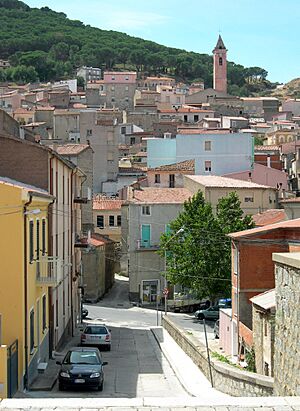Bitti facts for kids
Quick facts for kids
Bitti
Bitzi
|
||
|---|---|---|
| Comune di Bitti | ||
 |
||
|
||
| Country | Italy | |
| Region | Sardinia | |
| Province | Nuoro (NU) | |
| Area | ||
| • Total | 216.2 km2 (83.5 sq mi) | |
| Elevation | 549 m (1,801 ft) | |
| Population
(30 June 2017)
|
||
| • Total | 2,823 | |
| • Density | 13.057/km2 (33.818/sq mi) | |
| Demonym(s) | Bittesi | |
| Time zone | UTC+1 (CET) | |
| • Summer (DST) | UTC+2 (CEST) | |
| Postal code |
08021
|
|
| Dialing code | 0784 | |
| Patron saint | St. George | |
| Saint day | April 23 | |
Bitti (which is called Bitzi in the Sardinian language) is a town in the Province of Nuoro in the Sardinia region of Italy. It is located about 140 kilometers (87 miles) north of Cagliari and about 20 kilometers (12 miles) north of Nuoro.
Bitti shares its borders with several other towns. These include Alà dei Sardi, Buddusò, Lodè, Lula, Nule, Onanì, Orune, Osidda, and Padru.
History of Bitti
The name Bitti comes from the Sardinian word bitta, which means "female deer". This town has a very long history, going all the way back to Roman times.
It was first mentioned in written records in the year 1170, where it was called Bitthe. For a time, Bitti was an important provincial capital within the Giudicato of Gallura. A "Giudicato" was like a small independent state or kingdom in Sardinia during the Middle Ages.
Later, starting in the 1300s, Bitti became part of the Giudicato of Torres. After that, it was included in an area called the marquisate of Orani. A "marquisate" was a type of territory ruled by a marquis, a noble title.
What to See in Bitti
Bitti has some interesting places to visit, especially if you like history and old buildings.
- Su Romanzesu nuragic archaeological complex: This is an ancient site with ruins from the Nuragic civilization. The Nuragic people lived in Sardinia thousands of years ago and built unique stone towers called nuraghe. This complex shows how they lived and worshipped.
- Church of Santu Jorgi (St. George): This church is dedicated to St. George, who is the patron saint of Bitti. The town celebrates his feast day every year on April 23.
See also

- In Spanish: Bitti para niños
 | Sharif Bey |
 | Hale Woodruff |
 | Richmond Barthé |
 | Purvis Young |



